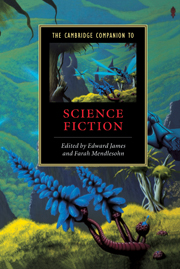Book contents
- Frontmatter
- Introduction
- Part 1 The history
- Part 2 Critical approaches
- Part 3 Sub-genres and themes
- 11 The icons of science fiction
- 12 Science fiction and the life sciences
- 13 Hard science fiction
- 14 Space opera
- 15 Alternate history
- 16 Utopias and anti-utopias
- 17 Politics and science fiction
- 18 Gender in science fiction
- 19 Race and ethnicity in science fiction
- 20 Religion and science fiction
- Further Reading
- Index
- Series List
19 - Race and ethnicity in science fiction
from Part 3 - Sub-genres and themes
Published online by Cambridge University Press: 28 May 2006
- Frontmatter
- Introduction
- Part 1 The history
- Part 2 Critical approaches
- Part 3 Sub-genres and themes
- 11 The icons of science fiction
- 12 Science fiction and the life sciences
- 13 Hard science fiction
- 14 Space opera
- 15 Alternate history
- 16 Utopias and anti-utopias
- 17 Politics and science fiction
- 18 Gender in science fiction
- 19 Race and ethnicity in science fiction
- 20 Religion and science fiction
- Further Reading
- Index
- Series List
Summary
Science fiction and the criticism of the genre have so far paid very little attention to the treatment of issues relating to race and ethnicity. The African-Caribbean writer Nalo Hopkinson says about her sf novel Brown Girl in the Ring (1998), 'I saw it as subverting the genre which speaks so much about the experience of being alienated, but contains so little written by alienated people themselves.' Most English-language sf is written by whites. While some African-American writers produce work that has fantastic or magical elements, this work is not generally grouped with sf or fantasy; it is instead published as and treated by critics as African-American literature. The magical realist elements of Mexican, Native American or Indian subcontinent literatures are also not published or reviewed as speculative literature. Salman Rushdie's novel Midnight's Children (1980), for example, explores Indian independence and the tensions between Moslems and Hindus through the eyes of a boy who is one of a group of children born with powers such as telepathy, but it is not generally considered science fiction. Samuel R. Delany and other black authors, including Charles Saunders and Walter Mosley, have written about the racial issues connected to the field, ranging from the initial cold-shoulder treatment of Delany by racist old-guard white writers to the lack of a substantial black audience for the genre, but neither sf about race nor criticism of it have achieved the same prominence that works about gender issues have.
- Type
- Chapter
- Information
- The Cambridge Companion to Science Fiction , pp. 253 - 263Publisher: Cambridge University PressPrint publication year: 2003
- 11
- Cited by



